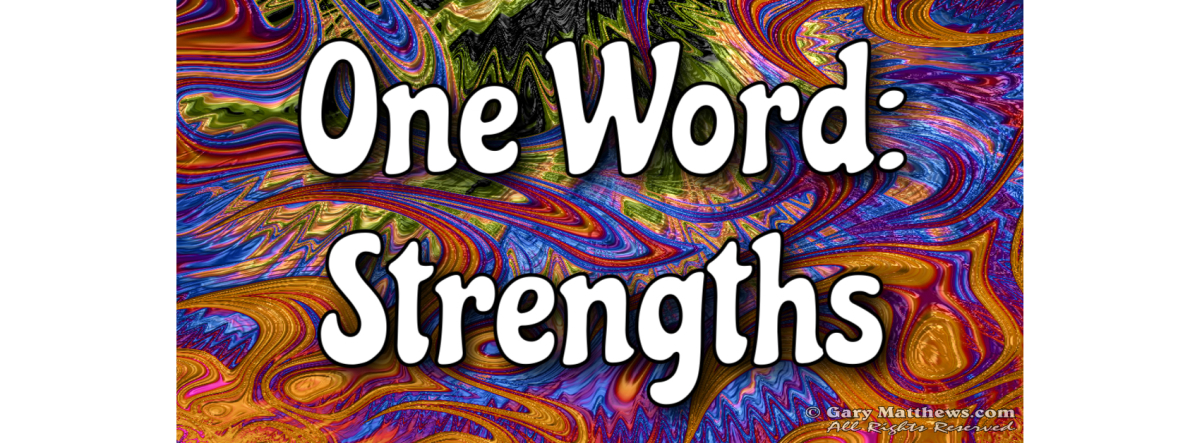“Strengths” first caught my attention for being the longest English word with only one vowel.
Longest, that is, in number of letters. There are other ways of measuring lengths.

Nowadays, if we ask such a question on any Internet forum like Quora, while forgetting to specify letter-count, there’s no shortage of people to remind us that lots of words can be made as long or longer by drawing out their pronunciation.
“Om”, the sacred sound used in mantra-chanting meditation, traditionally is held and stretched out to very long intervals. Sound-wise, it’s surely a longer word – with only one vowel.
There are, however, nine letters in “strengths”, of which only one is a vowel. Measured that way, I don’t know of another word that long.
I also appreciate “strengths” for its meaning. The plural form reminds us that strength is not a single attribute. There are many strengths, just as there are many weaknesses.
In any partnership, such as marriage, it’s important that the partners’ strengths be complementary. That is, we should cancel out each other’s weaknesses by virtue of our strengths.
If my wife, for example, were mediocre at cooking, then I’d need to be a really good cook. If I’m inept at managing money, she should be proficient at it.
(As it happens, Cheri and I both are skilled cooks. The money example strikes closer to home: She’s far better at handling it than I am.)
It’s okay if we both have lots of the same strengths (as with cooking). But heaven help any partnership – business, marriage, or whatnot – in which all parties share too many weaknesses!
Back to spelling: Are there any English words with no vowels – and if so, which is the longest?
Apparently that honor goes to “tsktsks”, with seven letters. But this word has vowel sounds that are pronounced, even if they’re unwritten. Are there words with no vowels either sounded or spelled?
That depends on whether we count expressions like “shh”, “brr”, “mmm-mmm”, and the like. I count them. But not everyone would.
Disregarding vowel number, are there any other one-syllable words as long as “strengths”? Yes, quite a few – words like “screeched”, “scratched”, and “stretched”, also with nine letters.
There also are at least two 10-letter one-syllable words: “schmaltzed” and “scraunched”. The former means “gave a sentimental atmosphere to”; the latter, “crunched” or “made a crushing noise”.
“Schtroumpfed” has been proposed as a 12-letter word with only one syllable. Let’s disallow it, however, since it turns out to have been imported from the fictitious Smurf language. (Might we also count Klingon words?)
More plausibly, “squirrelled” has been suggested as an 11-letter one-syllable word. (Note the double “l”, which is an acceptable alternative to the more common single-“l” spelling.) If we accept it, this would make it probably the longest such English word.
The question is whether “squirrelled” has one syllable or two. Its proponents argue that it has only one because it rhymes perfectly with “whirled”, “world”, “curled”, “girl”, and other words usually considered as having only one syllable.
I agree that “squirrelled” rhymes precisely with “world” and the like, having the same number of syllables. My problem is that to my ear, all these words have two syllables, not one.
My critics might scoff, insisting that this (mis)perception of mine simply reflects my linguistic roots in the American South. Here (they sneer), we pronounce “y’all” as a three-syllable word, stretching it out with that Southern drawl for which we are famous.
In the most refined form of British English (called RP, for “received pronunciation), “squirrelled” is definitely pronounced with two syllables. Some say the single-syllable version characterizes lower-class dialects of English (such as those found in America).
In my confusion, I turned to an interesting website called HowManySyllables.com. It lists “whirled”, “world”, and “curled” as having one syllable each. But it counts two syllables in “squirrelled”. Why the disparity? I’m not sure. Whatever the right number, I remain convinced they should be the same.
Be that as it may, “strengths” is a hard word to say aloud. It’s that pesky “ngths” combination (also troublesome in “lengths”). Our tongues may feel tempted to drop the “g”, leaving “strenths”, or to change the “th” to a simple “t” (“strengts”). Fight the temptation!
It’s also a bit hard to type – for me, anyway. My fingers keep reversing the order of the letters in “th”, prompting my spell-checker to squawk about “strenghts”.
Finally, I was amazed to discover that the letters in “strengths” can be reshuffled to produce a meaningful anagram: “GSR tenths”. Or can it? That depends on whether we allow GSR as a word. (It’s the standard medical acronym for “galvanic skin response”.)
(This article is part of my series on words that are #worth1000pictures.)

2 responses to “One Word: Strengths”
I’m not a philologist, but I believe you missed one other way that ‘strengths’ is longest: it has the most phonemes. Not the standard way to express them, but the 7 of them (in only 9 letters and one syllable!) are approximately ss, t, r, eh, ng, thh, ss. (I THINK it is correctly s t r e ŋ θ s… but again, I’m not an expert!) Thanks for your article.
Great catch, Mark. Thanks for your insights.
Checking out your home page (http://www.nandor.org/mj), I see you’ve compiled lots of intriguing word lists — like your comprehensive list of words that can be spelled using chemical symbols. Haven’t seen anything quite like these before, but love your site, and hope folks will go read it.
Although you don’t mention him (unless I’m overlooking it), I’m getting the impression you share my enthusiasm for the writing of Isaac Asimov. Is this inference correct?